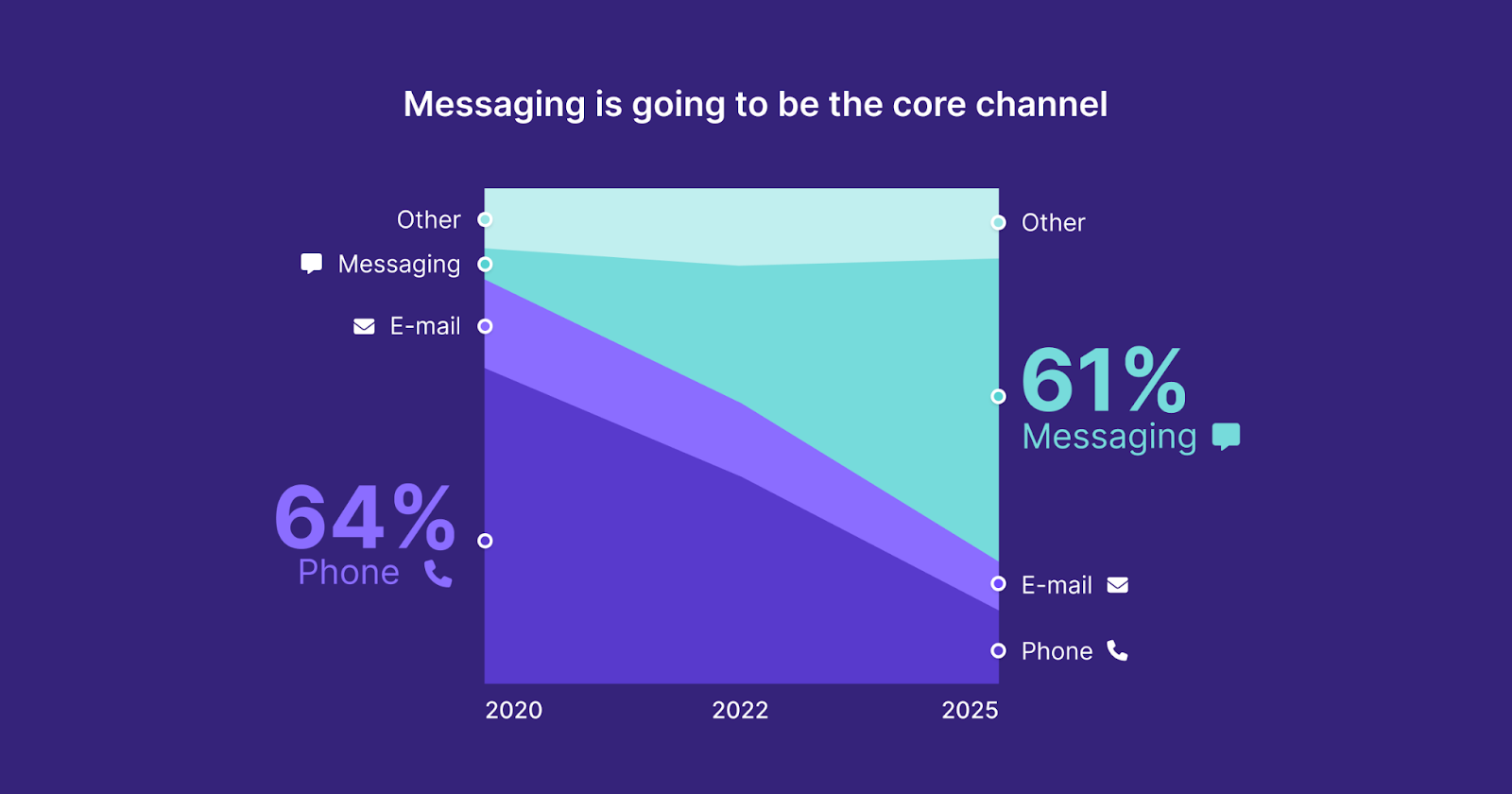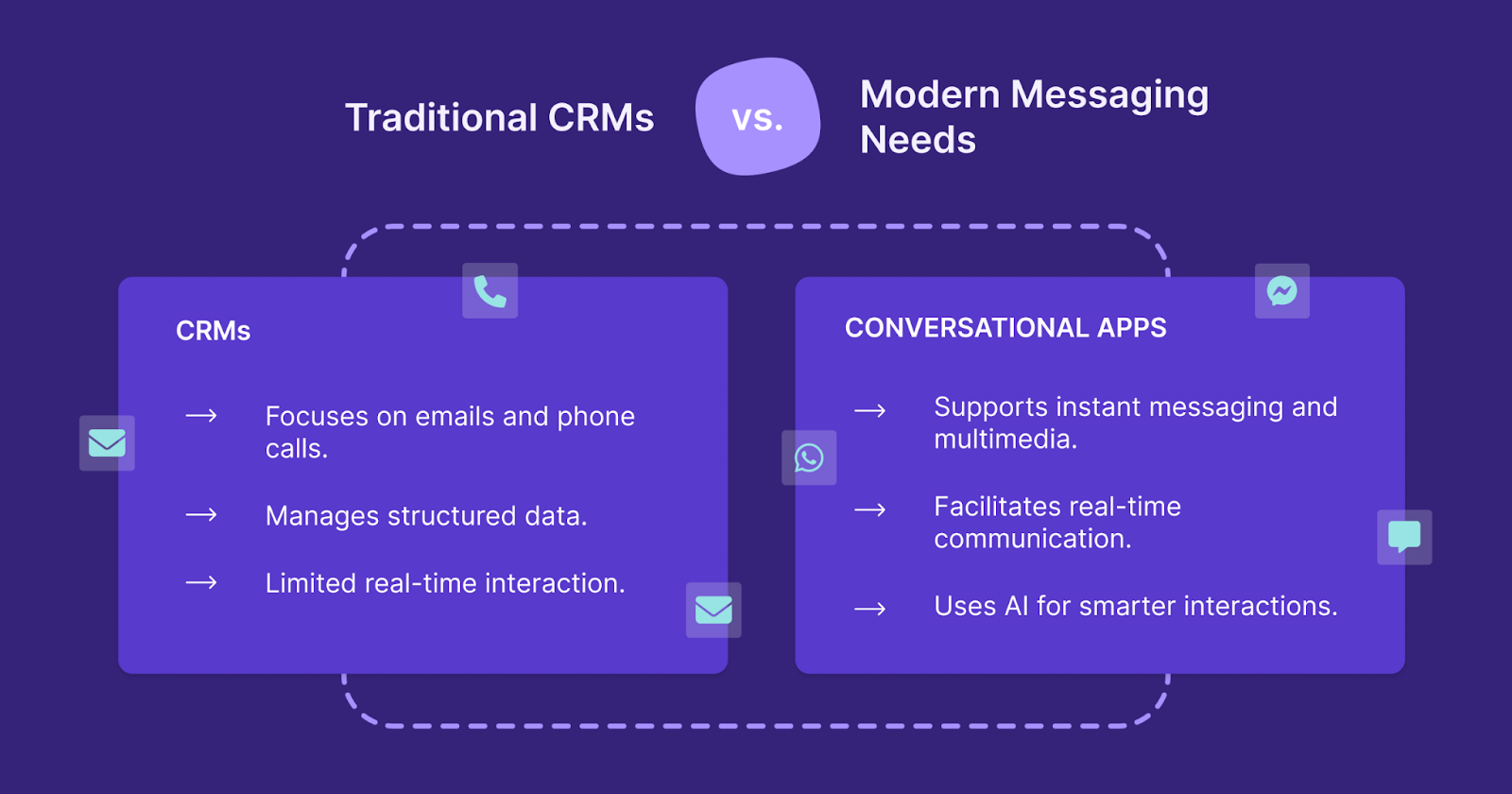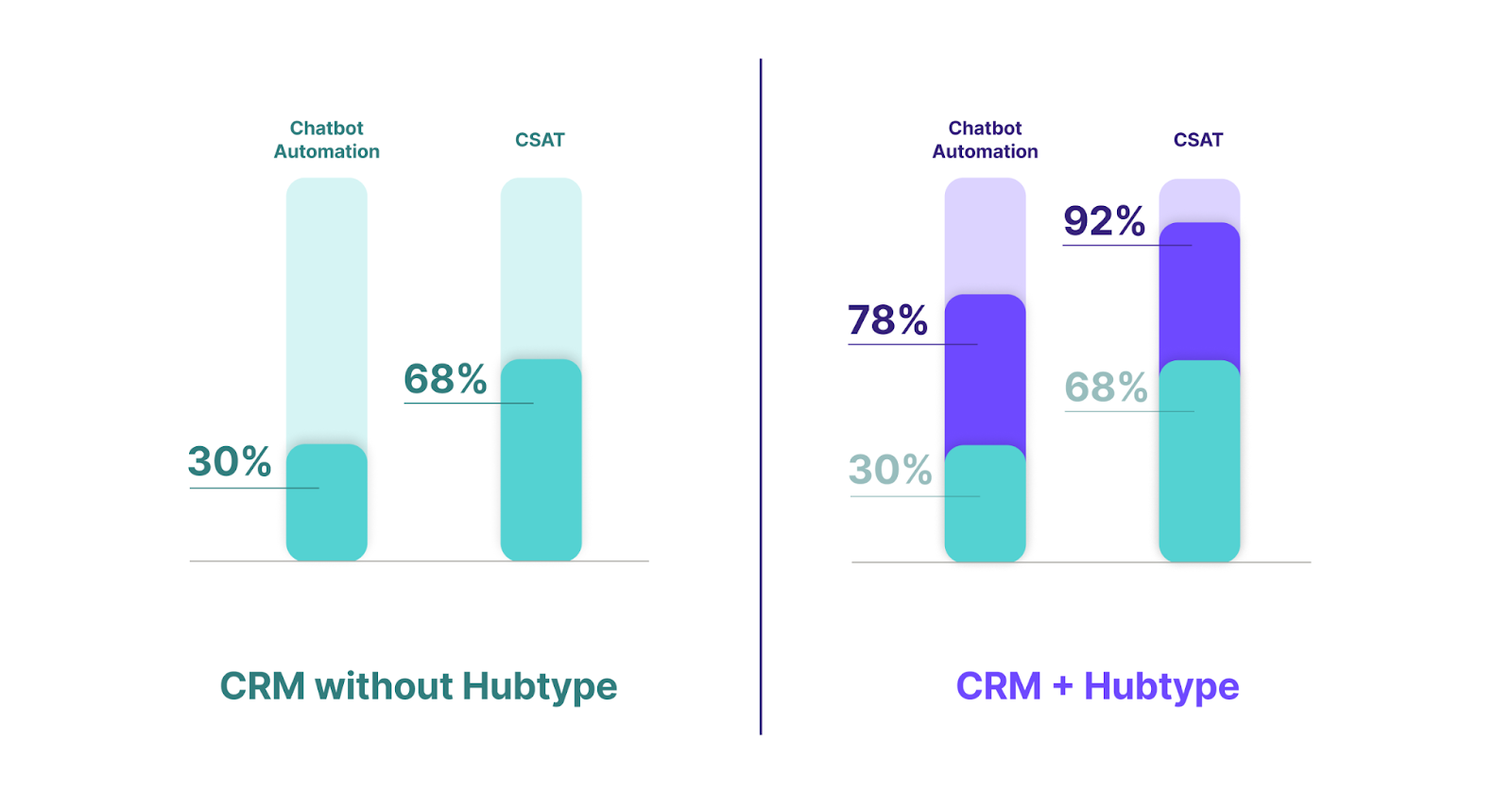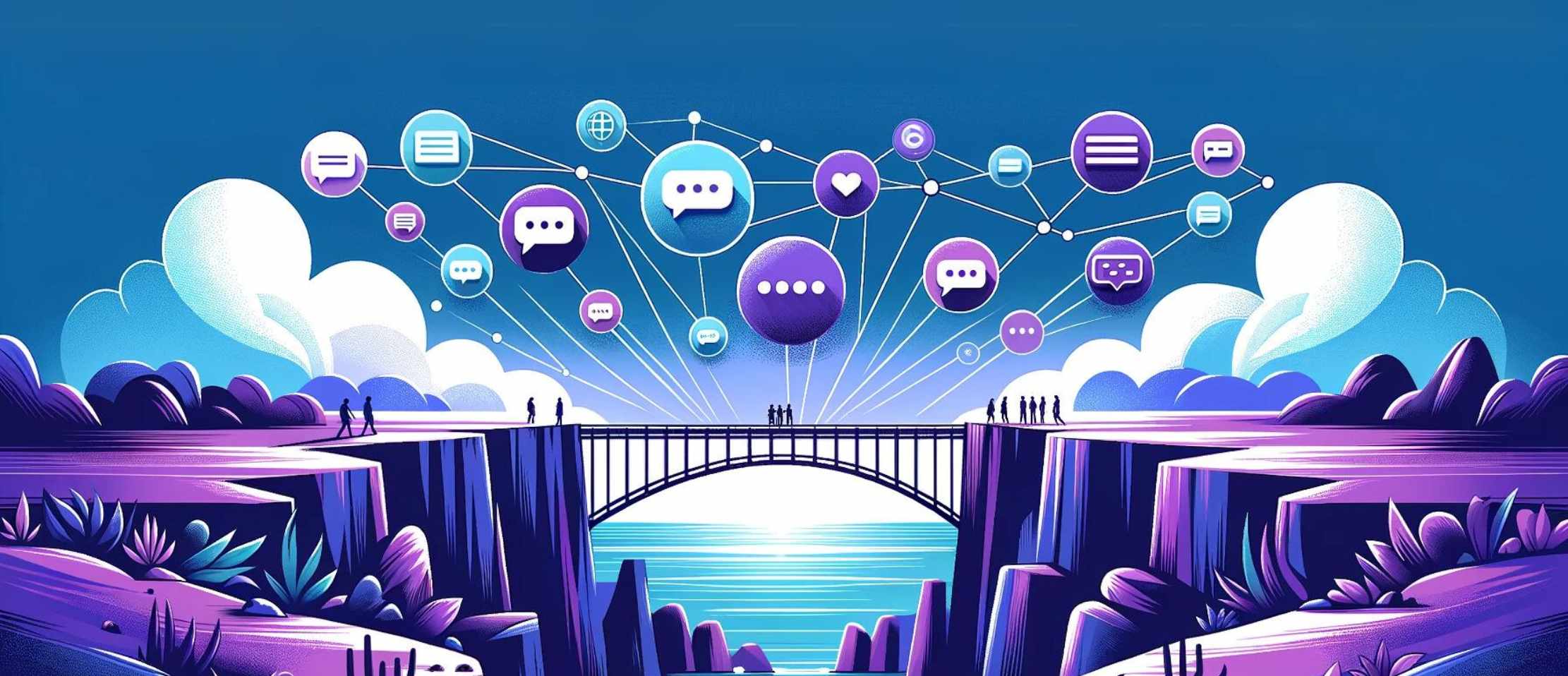
Communicate with customers where they are
The way we communicate has fundamentally changed.
We all have nostalgic memories of outdated communication methods—think home phones and chatrooms. Yet, while advanced messaging channels have seamlessly integrated into our personal lives, the adoption of new communication technologies in professional settings has not been nearly as swift.
Smart companies use CRMs like Salesforce to manage customer interactions. However, truly innovative companies are improving these systems with conversational AI, pushing the boundaries of customer interactions.
Gone are the days of relying solely on the limitations of emails and phone calls. Today's communication needs are immediate and complex, spanning across generations and platforms.
We must be where our customers are.
The conversational shift
In the next five years, messaging, and chat are expected to handle 80% of all B2C communications. Developing robust strategies to embrace these channels will prevent businesses from falling behind.
This shift toward messaging has accelerated rapidly, particularly since the start of the COVID-19 pandemic. Previously ranked fifth in channel usage, messaging rose to second place by the end of 2021 and is on track to surpass email (if it hasn’t already), projected to dominate with a 61% share of all communication channels by 2025.

In a recent Deloitte study, consumers were shown to now spend over 5.5 hours in messaging apps each month, a 67% increase versus time in social media, highlighting the shift towards messaging as the primary communication channel.
Leading retailers and service providers have already capitalised on this trend by integrating digital customer interaction solutions that enhance customer interaction and analytics, demonstrating the potential benefits of this shift. If businesses fail to adapt swiftly they’ll face a serious risk to remain competitive and relevant.
Why CRMs fall short on messaging and chat
CRMs completely changed the game when first introduced. They revolutionised business communication with streamlined data management, focusing primarily on emails and phone calls. The problem is that two decades later, these focuses haven’t faced much change.
Society has become more efficient and its needs have changed. This is most evident in the way we communicate with one another. Messaging apps and social media platforms have become the preferred communication channels, not just for Gen Z and millennials—over 50% of WhatsApp users are over the age of 35.
Salesforce and other CRM platforms have recognised the growing importance of messaging and chat by introducing native conversational solutions. However, these text-only solutions fail to fully leverage the dynamic capabilities of popular messaging platforms like WhatsApp and Messenger, which consumers increasingly prefer.
While CRMs provide the basic connectors to open these messaging channels, simply establishing the channel is not enough. As these platforms evolve, the basic text-only interface provided by CRMs requires more depth to adapt to the multimedia and real-time interaction capabilities that users now expect. These limitations prevent companies from fully harnessing the potential of messaging and chat channels, causing them to miss opportunities for improved customer engagement, satisfaction, and personalised selling opportunites.
It would be misguided to say that CRMs are becoming useless. It’s that CRMs today face limitations when it comes to messaging and chat. They were never designed to handle the asynchronicity and multimedia capabilities that modern messaging platforms offer. While CRMs are effective at managing workflows and data, they struggle to fully leverage features that are now standard in communication—like instant multimedia sharing and real-time interactions across various platforms.
Despite Salesforce's projected revenues of $34.9 billion in 2024, its Einstein chatbot functionality faces inherent limitations in delivering the nuanced, visually rich messaging experiences that today’s consumers expect.

CRMs are great at connecting systems, but they lack the depth to manage the nuanced, multifunctional demands of complex digital communications. The gap is widening as consumer expectations shift towards more dynamic and responsive interactions, with over 82% of consumers expecting immediate responses to their inquiries.
Businesses relying solely on traditional CRM systems to manage customer communications may find themselves at a disadvantage. Without integrating advanced conversational technology—a comprehensive ecosystem that includes AI-driven interactions—companies will struggle to keep pace with the sophisticated demands of modern customer engagement.
From websites to WhatsApp
WhatsApp currently boasts over 2.78 billion users, becoming an increasingly pivotal channel in customer communications. It's not just about sending messages. Marketing, Sales, and Customer Service teams have learned to harness websites, but now forward-thinking teams are customising WhatsApp to fit their unique operational needs. This shift poses the potential to transform WhatsApp into a multifaceted platform, much like the comprehensive WeChat experiences in China.
The challenge with CRMs is that they were primarily designed to link agents to communication channels. They fall short in adapting to the broader functionalities that modern messaging platforms demand.
In essence, messaging channels like WhatsApp are poised to surpass traditional websites as the primary means of business communications. This pivotal shift emphasises the need for specialised technology tailored to messaging channels. This won’t be a one-size-fits-all solution.
The solution is to integrate conversational apps seamlessly with existing CRMs, enhancing their capability to support the sophisticated and varied interactions today’s customer communications require.
Customers expect immediate responses, a demand that CRMs focused mainly on data and workflow management, often fail to meet efficiently.
High ROI with messaging apps
Reducing sales efforts and earning more profits might sound like a pipedream, but it’s expected that by 2025 40% of customer service organisations will evolve into profit centres by spearheading digital customer engagement.
While rooted in problem-solving, customer support is transforming into a vital revenue-generating arm of businesses. This shift means that customer service will increasingly influence business outcomes.
Supported by fresh objectives, metrics, and organisational structures, this area is poised to drive new business by mastering digital engagement and customer relationships. As a result, businesses are starting to view their customer service functions as central to their revenue generation strategy, not just a support cost.
This transformation is fundamental for companies that want to stay ahead. By integrating advanced messaging solutions, companies can unlock this potential, turning every customer interaction into an opportunity to increase satisfaction and drive sales.
Redefining customer interactions
Why cling to outdated systems when you can redefine the standards with advanced communication technology? At Hubtype, we've engineered our conversational apps to optimise interactions on leading platforms like WhatsApp, Messenger, and Telegram, much like how Apple revolutionised user interaction with Siri, blending AI with user-friendly interfaces. Our technology not only meets modern communication demands but also sets new industry benchmarks, with businesses reporting up to a 90% customer satisfaction rate, demonstrating the transformation from traditional support to dynamic engagement centres.

Embracing the future with conversational apps
Adopting conversational apps places your company ahead of the pack when it comes to customer communication trends. These tools allow businesses to excel in today's market and seamlessly adapt to tomorrow's communication challenges. By focusing on conversational technology, your business is better equipped to meet evolving customer expectations with agility and precision.
Let's delve deeper into why conversational apps are not merely an option but a necessity for modern businesses with real results from real clients:
- Instant Engagement: Over 82% of consumers expect immediate responses to their inquiries. Conversational apps meet these expectations head-on, transforming customer service into a real-time exchange.
- Beyond Millennials: It’s not just the younger generations shifting to messaging; older demographics are also adopting these convenient communication methods. This broad adoption makes conversational apps a universal solution.
- Operational Efficiency: Integrating conversational apps can reduce the average handling time of customer inquiries by up to 40% and increase the number of goals completed by 25%. This efficiency is driven by the automation of routine inquiries and the ability to handle complex customer interactions more swiftly, which traditional CRMs often fail to manage effectively.
- Cost-Effectiveness: Conversational apps significantly reduce operational costs. Companies using Hubtype have reported up to a 30% decrease in call centre volumes, translating to substantial cost savings. By 2025 40% of customer service organisations will evolve into profit centres.
- Increased Customer Satisfaction: Businesses that integrate conversational apps see marked improvements in customer satisfaction rates. For instance, our clients have observed a 2X increase in customer satisfaction due to more effective and engaging interactions.
- Data Security and Compliance: Data breaches are costly. Hubtype ensures that all communications are encrypted and GDPR-compliant, safeguarding sensitive information.
- Seamless Integration: Transitioning to Hubtype doesn’t mean overhauling your existing systems. Hubtype is a quick setup and operates smoothly on top of existing CRMs, intensifying their capabilities without disrupting current operations.
The evolution of human communication requires a shift to tools that can handle immediate and complex digital interactions. Conversational apps represent a pivotal advancement in how businesses engage with customers, offering a blend of speed, efficiency, and personalisation that traditional systems can’t match.
Join us as we transform the landscape of customer communication, making every interaction not just a transaction, but a connection that fosters customer loyalty and satisfaction.

.jpg)


